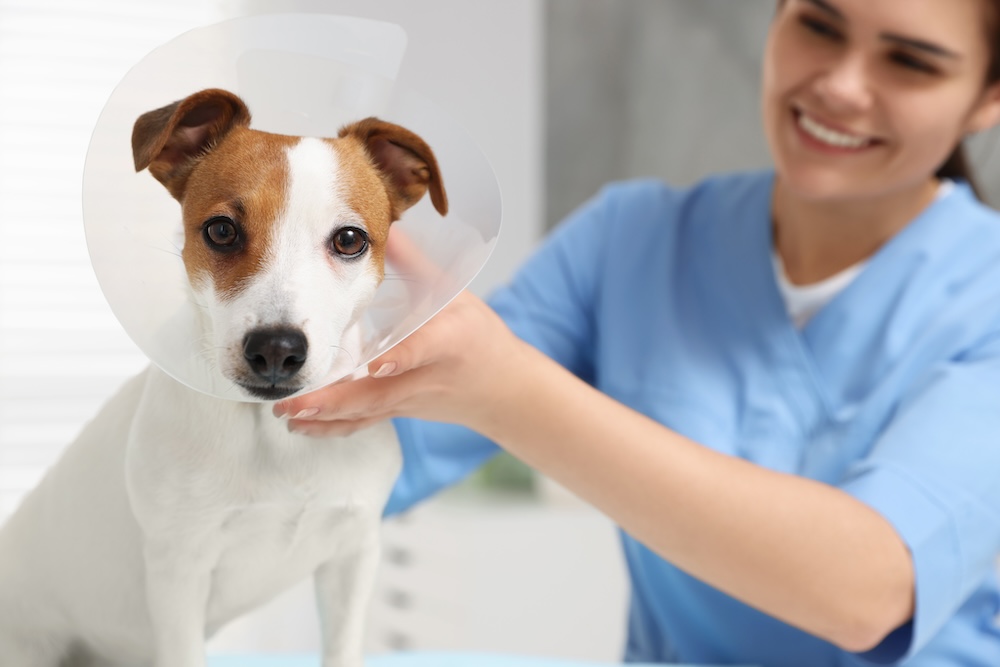The thought of your beloved dog undergoing surgery can be a daunting experience. Whether it’s a routine procedure or a complex operation, being well-informed about what to expect from surgery for dogs can help alleviate some of the anxiety and ensure that you’re prepared to provide the best care for your canine companion. Today we cover everything you need to know about dog surgery, from pre-operative preparations to post-operative care and recovery.
Types of Dog Surgeries
Dog surgeries can be categorized into two main types: elective and emergency.
Elective Surgeries
Elective surgeries are planned procedures that are not immediately necessary but are performed to improve the dog’s quality of life or prevent future health issues. Common elective surgeries include:
- Spaying and Neutering: Prevents unwanted pregnancies and reduces the risk of certain cancers and behavioral issues.
- Dental Cleanings and Extractions: Maintains oral health and prevents complications from dental diseases.
- Orthopedic Surgeries: Repairs fractures, addresses joint issues like hip dysplasia, or corrects ligament tears.
- Mass Removal: Removes benign or malignant tumors to prevent further health complications.
Emergency Surgeries
Emergency surgeries are performed in response to urgent health issues that pose an immediate risk to the dog’s life. These include:
- Gastric Dilatation-Volvulus (GDV): Also known as bloat, this condition requires immediate surgical intervention to save the dog’s life.
- Trauma: Surgeries to repair injuries from accidents, such as broken bones or internal bleeding.
- Foreign Object Removal: Removes objects that the dog has swallowed and cannot pass naturally, which can cause blockages or perforations.
Pre-Operative Preparations
Proper preparation is essential to ensure a successful surgical outcome and smooth recovery. Here are the key steps involved in pre-op preparations for dog surgery:
Pre-Surgical Assessment
Before surgery for dogs, a thorough veterinary examination is conducted to assess your dog’s overall health and identify any potential risks. This assessment may include blood tests, X-rays, and other diagnostic tests to ensure your dog is fit for anesthesia and surgery.
Fasting
Your veterinarian will provide specific instructions regarding fasting before surgery for dogs. Typically, dogs should not eat for 8-12 hours before the procedure to reduce the risk of complications during anesthesia. Water intake may be restricted a few hours before surgery.
Medications and Supplements
Inform your veterinarian about any medications or supplements your dog is currently taking. Certain medications may need to be paused or adjusted before surgery to prevent adverse reactions.
The Surgical Procedure
On the day of surgery, your dog will be admitted to the clinic, and the veterinary team will proceed with the following steps:
Anesthesia
Administering anesthesia ensures that your dog remains pain-free and unconscious throughout the surgery. Your dog will be closely monitored to ensure their safety during the procedure.
Surgery
The type and duration of the surgery will vary depending on the procedure being performed. The veterinary surgeon will use sterile instruments and techniques to minimize the risk of infection and complications.
Post-Operative Monitoring
After the surgery is completed, your dog will be moved to a recovery area where they will be monitored as they wake up from anesthesia. Vital signs such as heart rate, respiration, and temperature will be closely observed to ensure a smooth recovery.
Post-Operative Care and Recovery
Proper post-operative care is crucial to ensure your dog’s successful recovery. Here are some essential aspects of post-surgery care:
Pain Management
Your veterinarian will prescribe pain relief medications to keep your dog comfortable during the recovery period. Administer these medications as directed and monitor your dog for any signs of pain or discomfort.
Wound Care
Follow your veterinarian’s instructions for caring for the surgical site. This may include cleaning the wound, applying topical medications, and checking for signs of infection such as redness, swelling, or discharge.
Activity Restriction
Restrict your dog’s activity to prevent strain on the surgical site and allow proper healing. This may involve keeping your dog in a confined space, using a leash during bathroom breaks, and avoiding stairs or jumping.
Nutrition and Hydration
Ensure your dog has access to fresh water and provide a balanced diet to support their recovery. Your veterinarian may recommend a special diet or feeding schedule during the recovery period.
Follow-Up Appointments
Schedule and attend follow-up appointments with your veterinarian to monitor your dog’s progress and address any concerns. These visits are essential for removing stitches, assessing healing, and adjusting care plans as needed.
Trust the Experts
At Faithful Friends Veterinary Clinic, we are committed to providing the highest standard of care for your dog before, during, and after surgery. By understanding the surgical process and following your veterinarian’s guidance, you can help ensure a smooth and successful recovery for your canine companion. If you have any questions or concerns about your dog’s surgery, don’t hesitate to contact us. We’re here to support you every step of the way.




